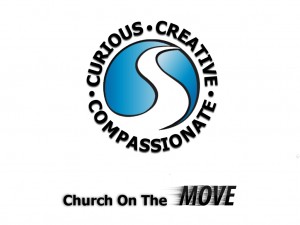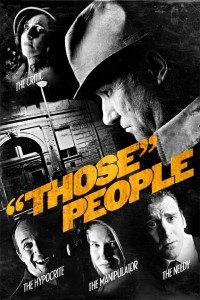Daily Time Grind – Time Margin
Sycamore Creek Church
October 21 & 22, 2012
Tom Arthur
Exodus 20:8-11
Peace friends!
Why did the man put a clock under his desk? He wanted to work overtime.
Why did the girl sit on her watch? She wanted to be on time.
Why did your sister shoot the alarm clock? Because she felt like killing time.
Time is killing us…
Today we’re talking about the things that grind us down daily when it comes to our time. We’re all a little or a lot overtaxed, overstressed, and overcommitted. These time commitments slowly but surely wear us down, like the tread on a tire wearing down.
I struggle with this in my own life. Every time I enter worship I see 20-30 conversations I want to have. Every day when I wake up I think about how I need to:
- Spend time with God
- Spend time with my wife
- Spend time with my son
- Spend time on myself
- Spend time exercising
- Spend time learning and reading
- Spend time with my extended family (two sets of parents, three brothers, a sister, and two step-sisters, grandparents, nieces and nephews, etc.)
- Spend time with my church staff
- Spend time with my church unpaid staff (team leaders)
- Spend time with various teams (Launch Team)
- Spend time with my small group
- Spend time with my church members (150 of them)
- Spend time with my community (thousands of them)
- Spend time in my neighborhood (community garden)
- Spend time taking care of home business (bills, money, etc.)
- Spend time sleeping well
Spend…spend…spend…spend…Where are the deposits? Where is the time margin?
The Problem
What I’ve just described is not unique to me. I don’t intend a pity party for myself. I only talk about myself because confidentiality won’t let me talk about you! But all these things are true about you too. One writer says, “Our modern view of time is to compress it and milk it for every nanosecond of productivity we can get” (Swanson, 111). He adds, “In 1967, testimony before a Senate subcommittee claimed that by 1985 people could be working just twenty-two hours a week or twenty-seven weeks a year” (Swenson, 114). The reality has been that in 1967 we worked 1716 hours/year. In 2000 we worked on average 1878 hours/year at work. That comes to four more forty-hour work weeks a year, or one extra month of work a year! It’s not just true about adults either. Students are overloaded with homework which is coming at a younger and younger age. Then there’s extracurricular activities that parents sometimes over-program their children into.
Smartphones are supposed to help us stay connected and manage our time better, but:
A study at MIT’s Sloan School of Management found that smartphone users who constantly check email on their Blackberries and smartphones are experiencing more stress. The need to check these cell phones has led to a compulsion—one that has them wanting to check their email at grocery stores, at the gym and any time their hands are free. That compulsion leads to considerably greater amounts of stress and anxiety. (manofthehouse.com)
Time is killing us. Or maybe better said, the way we spend our time is killing us.
I came across this prayer recently that I think sums the whole situation up nicely:
Holy One, there is something I wanted to tell you, but there have been errands to run, bills to pay, meetings to attend, washing to do … and I forget what it is I wanted to say to you, and forget what I am about or why. Oh God, don’t forget me please, for the sake of Jesus Christ.
Our modern deadly sin is not sloth but busyness!
Margin
All this busyness wasn’t and isn’t God’s plan for us. If we go back to the big ten—I’m not talking football here—we find that one of the ten commandments speaks to this situation quite clearly.
Exodus 20:8-11 NLT
Remember to observe the Sabbath day by [working incessantly? No, by] keeping it holy. Six days a week are set apart for your daily duties and regular work, but the seventh day is a day of rest dedicated to the LORD your God. On that day no one in your household may do any kind of [what?] work. This includes you [except you when you’re really busy? Ummm…No.], your sons and daughters, your male and female servants, your livestock, and any foreigners living among you [Notice who isn’t listed in here! Your wife! That must mean she doesn’t get a break. No way. The spirit of the commandment is that everyone stops working on the Sabbath!]. For in six days the LORD made the heavens, the earth, the sea, and everything in them; then he rested on the seventh day. That is why the LORD blessed the Sabbath day and set it apart as holy.
Main Point
Here’s the main point of this message: We were created not just to produce, but to enjoy. Yes, despite what your Puritan work-ethic grandma told you, you were created to enjoy life and not just to work yourself til death.
A Catechism is a set of questions and answers that is intended to teach the Christian faith. One classic catechism is the Westminster Catechism. The first question and answer of the Westminster Catechism is:
Q: What is the chief purpose of humanity?
A: To love God and enjoy him always.
Yes, that’s the first question. The first and most important thing about life is this: love God and enjoy God. When? Always!
If you’re a guest here this morning you may have thought that being a Christian is about following a set of rules that are supposed to make you not really enjoy life. So let me fix that mistake. The purpose of being a Christian is really about learning to enjoy God! Enjoy God! Ahh….
Back to the Sabbath. What exactly is the Sabbath? The Sabbath is simply a day of rest where you don’t work, you don’t produce, you’re not busy! Of course, the Sabbath has been abused in all kinds of ways in the past and your puritan work-ethic grandma probably told you that you couldn’t play cards on the Sabbath, or work in the yard, or do a host of other things. Jesus did a fair amount of teaching on the Sabbath too and he loosened up the interpretation of the Sabbath quite a bit, but didn’t do away with the idea.
Mark 2:27-28 NLT
Then he said to them, “The Sabbath was made to benefit people, and not people to benefit the Sabbath. And I, the Son of Man, am master even of the Sabbath!”
The Sabbath was made for you! It was intended to help you. It was intended to benefit you. Here at SCC we talk about being Curious, Creative, and Compassionate. Practicing the Sabbath is showing compassion to yourself, your family, and your faith.
Self, Family, Friends, Faith
I think underneath the idea of the Sabbath is a principle that we should think about time intentionally. Time is spent, but it shouldn’t be spent without some thought. And part of that thought should be to remember to spend some time on rest.
Some years ago I came across the idea of the big rocks. The big rocks idea is that a container can hold both sand and big rocks at the same time but only if the big rocks are put in first. If you put the sand in first, then there won’t be room for the big rocks. But if you put the big rocks in first, then the sand will filter in around the big rocks. Sand is the stuff that is urgent. It grabs your attention and won’t let go. It demands attention. Rocks are the things that are important but not necessarily urgent. That’s the thing about rest, you can go for a while without it while you attend to urgent demands, but it will eventually come back to bite you. So what are the big rocks in your life that you need to make sure you get in when it comes to the way you spend your time? I’d suggest that you need to put free-time, family-time, exercise-time, date-night, and God-time on your calendar, so that when someone asks if you’re free, you can say NO. These are all various forms of Sabbath rest. They are all Big Rocks that can easily get crowded out by the sand in your life.
Now I’ve got to admit that one of my fears in teaching this morning is that when I ask you how you spend your time and encourage you to think about what you need to say NO to, that you all will end up saying NO to serving in the church. But let me suggest that serving on some ministry team in some form or fashion is a big rock that you need to make sure is in the time-container of your life. It’s more important than a lot of things we tend to spend our time on like: watching TV, surfing the internet, and being involved in a host of other extracurricular activities for both adults and their children.
Let’s look at all these things as a whole…
Time Audit
Today I’d like you to do a time audit. I’d like you to reflect on how exactly you do spend your time and whether you’re getting those big rocks in that have to do with enjoying God, the chief purpose of all of us! Here’s a worksheet and some instructions on how to do a time audit:
Instructions:
- Rank your current commitment to each category with 1 being that you never do this and 5 being that you always do this.
- Select 3 to 5 areas that stand out for you and write when or how you will fulfill this time commitment.
- Narrow your focus by picking 1 to 3 areas to really work on in the next couple of weeks and circle them.
- Choose someone to share this with who will help hold you accountable.
| Commitments | Rating (circle one)1 = Never3 = Sometimes
5 = Always |
When/How |
| Daily Commitments | ||
| Time with God |
1 – 2 – 3 – 4 – 5 |
|
| Time with Family |
1 – 2 – 3 – 4 – 5 |
|
| Time for Self |
1 – 2 – 3 – 4 – 5 |
|
| Time with Friends |
1 – 2 – 3 – 4 – 5 |
|
| Family Prayer |
1 – 2 – 3 – 4 – 5 |
|
| 7-8 Hours of Sleep |
1 – 2 – 3 – 4 – 5 |
|
| Work/Employment |
1 – 2 – 3 – 4 – 5 |
|
| Other: _________________ |
1 – 2 – 3 – 4 – 5 |
|
| Weekly Commitments | ||
| Sabbath Day |
1 – 2 – 3 – 4 – 5 |
|
| Worship |
1 – 2 – 3 – 4 – 5 |
|
| Night at Home |
1 – 2 – 3 – 4 – 5 |
|
| Date Night |
1 – 2 – 3 – 4 – 5 |
|
| Other: _________________ |
1 – 2 – 3 – 4 – 5 |
|
| Weekly/Bi-Weekly/Monthly Commitments | ||
| Small Group |
1 – 2 – 3 – 4 – 5 |
|
| Service Team |
1 – 2 – 3 – 4 – 5 |
|
| Other: _________________ |
1 – 2 – 3 – 4 – 5 |
|
| Yearly Commitments | ||
| Vacation/Time Off |
1 – 2 – 3 – 4 – 5 |
|
| Spiritual Retreat(s) |
1 – 2 – 3 – 4 – 5 |
|
| Other: _________________ |
1 – 2 – 3 – 4 – 5 |
|
I will share this with: _____________________________________________________
You can spend your time unintentionally, or you can spend your time in an intentional way that leads to enjoyment of God and life. What does your time audit say about which way you spend time?
If you look at your time audit and realize that you’re not getting the big rocks in first, then here are a couple of tips for spending time differently:
- When being asked to do something in the future, ask yourself whether you could fit it in next week. If not, say NO.
- Turn off the television and internet (20-30 hours/week gained on average!).
- Practice simplicity – You don’t own stuff, it owns you. The less stuff you have, the less stuff you have to spend time maintaining.
- If you had only four hours…two hours…one hour today, what would you do with it?
Imagine
Time grinds our lives down, like the tread on a tire. But what if the church was a retread factory, putting margin back in our lives? If we had time margin, responding to crises wouldn’t send us overboard. We’d be free to stop at the side of the road to help someone. We would make less but be more content because we’d be living simply and spending less time maintaining our stuff. The church would be a retread factory for a stressed out, overtaxed, overcommitted world. We were created not just to work but to enjoy life and enjoy God.
Isaiah 30:15 NRSV
For thus said the Lord GOD, the Holy One of Israel: In returning and rest you shall be saved; in quietness and in trust shall be your strength. But you refused.
Today, will you receive or will you refuse?
Prayer
Holy One, there is something I wanted to tell you, but there have been errands to run, bills to pay, meetings to attend, washing to do … and I forget what it is I wanted to say to you, and forget what I am about or why. Oh God, don’t forget me please, for the sake of Jesus Christ.







Recent Comments